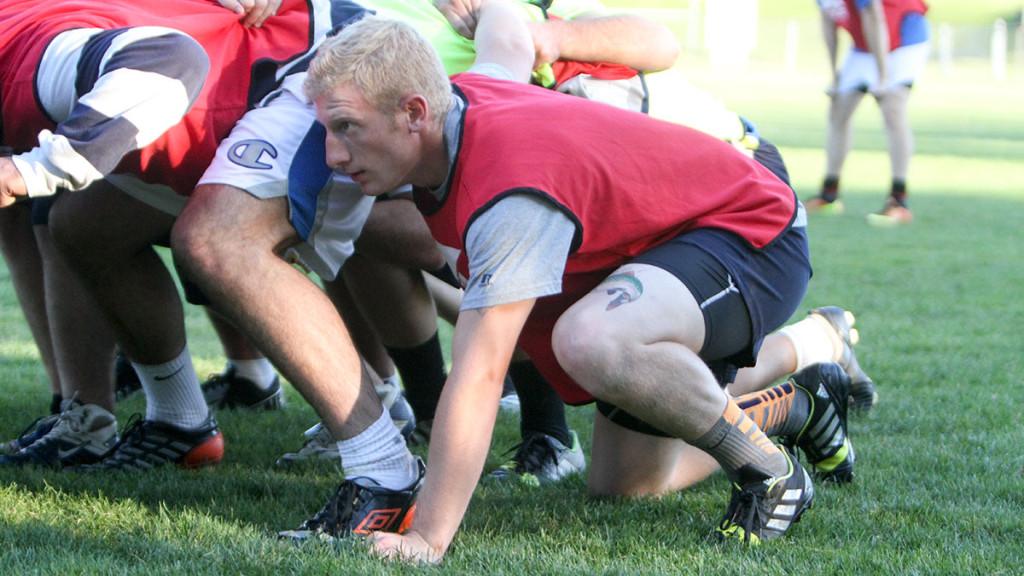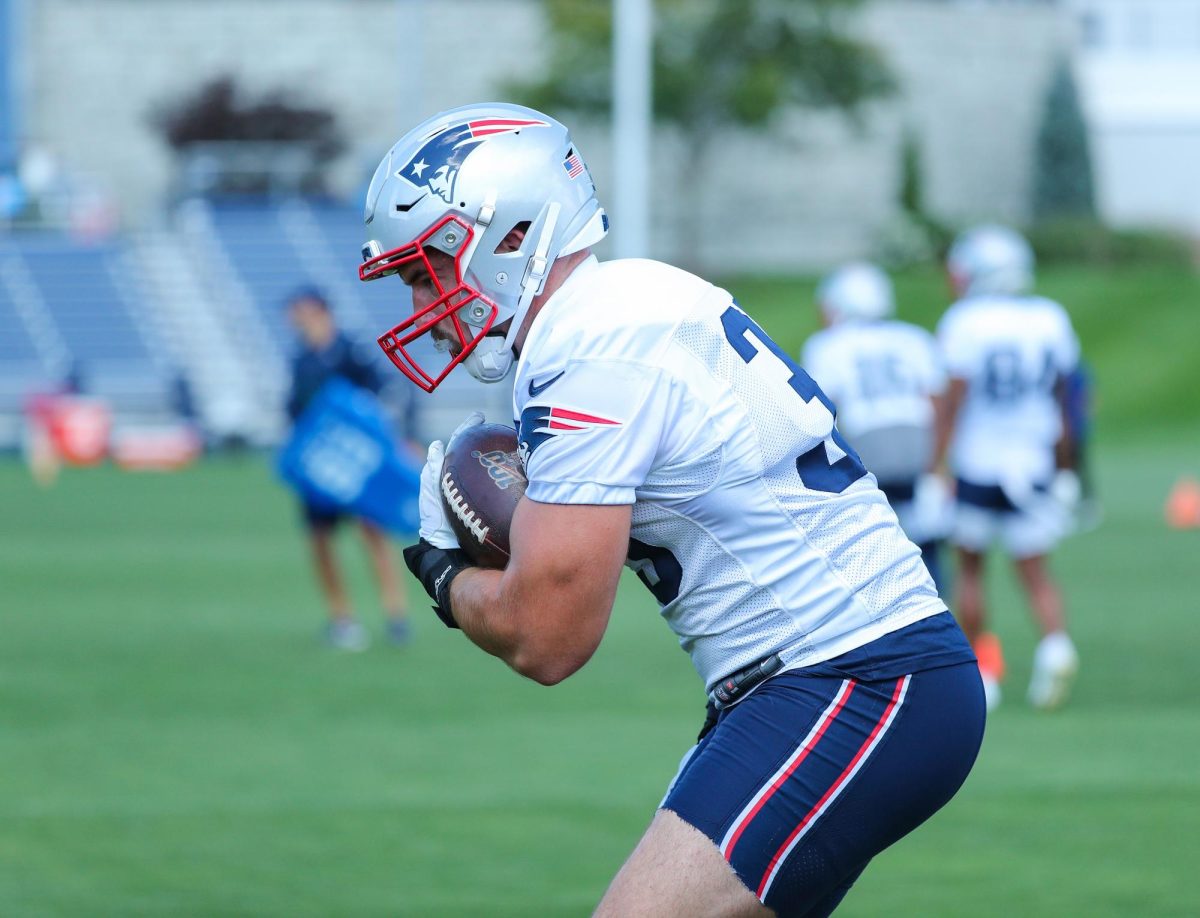At a practice at Yavits Field, a pack of 16 Ithaca College club rugby players bind tightly together to form a scrum, a method of restarting play after a minor infringement of the rules. As the ball is thrown under the tunnel of the players, each side of the interlocked bodies begin tussling for possession of the ball. Through the movement of their feet, the ball is slowly fed to the third row where senior forward Matthew Clum is positioned.
When his side ultimately gains possession, he sprints alongside his teammates in the attack. While Clum runs, the faint image of a blue-green fish can be seen on his left leg, right above his knee. Clum has a tattoo of a trout, one of his favorite fish, and a symbol of the passion he established as a little boy.
He developed a dedication to angling at age 4 when he began to find joy in being in the outdoors with his father. Clum said he has always loved the outdoors and fishing because of the adventures he gets to go on.
“I’ve been to places people will never get a chance to see, targeting fish, things that have made my life amazing,” he said. “I’ve seen 50-pound king salmon try and launch over a waterfall, bears running through the water chasing fish, all sorts of stuff.”
Since coming to college, Clum’s enthusiasm for fishing has only flourished. The scenic backdrop of Cayuga Lake and the falls around the area have given Clum a plethora of fishing opportunities to continue his dedication.
Clum wakes up to the darkness of the 5 a.m. sky to commence his morning fishing routine, which he performs year-round, regardless of the chilly weather conditions in Ithaca. The misty autumn air encompasses the frigid waters of Cayuga Lake in the early hours of the morning, but this is the perfect time for Clum to fish.
Clum strategically gets up early during the week to go fishing in order to avoid the tourists and college students who tend to crowd the areas on the weekends. Typically, he has roughly four to five hours to fish before he has to come back and go to his classes. He usually has his supplies ready to go the night before to guarantee a quick departure.
When he gets to the lake, he takes out his equipment. The most important equipment includeshis fly rod or spin rod, complete with a fresh line with no frays in order to avoid any weak points; a sharp hook to help him catch fish smoothly; his waders — waterproof boots that extend from his feet all the way up to his chest; and his fish bait. The stench of the supplies resembles a combination of seaweed, dirt and salt, odors that Clum said he has become all too familiar with.
He gets comfortable and slowly steps out into the greenish-brown–looking water that will eventually go above his knees and, many times, higher than his waist. Step by step, he gradually descends deeper. He pulls out his rod and slowly winds the reel. Gently, he casts his line and waits to catch the glistening rewards that dwell beneath the water’s surface.
Typically when in Ithaca, Clum will venture to Ithaca Falls and Taughannock Falls and go after populous fish in the area, including salmon and trout of different varieties. Clum said the best places to fish are normally the biggest waterfalls because the fish can’t get past the current.
Additionally, Clum frequently travels to Lake Ontario to fish for Chinook salmon in the fall. This particular type of salmon is about 30 pounds on average compared to other species that range from about 12–18 pounds. Clum said he can only keep three Chinook salmon a day in order to ensure fish reproduction and a sustainable fishery. Because of this, he will often donate the salmon and gives some to friends and professors.
“I don’t know what I would do with 75 pounds of salmon for myself, especially when I go almost every week,” he said. “So I donate a lot of salmon to food pantries and soup kitchens, so it’s not like I waste anything.”
Clum’s fishing adventures have certainly not been restricted to just the Central New York area, though. His excursions have taken him all across the country: He has fished in every state east of Mississippi River.
Out of all the states he has fished in, he said New York state has undeniably been the best location to fish because of the number of different fish he can target throughout the year. His father, Jerry Clum, said because the fishing is so good around the area, he will often come to Ithaca to fish with his son.
“He found out that a lot of fishing in New York state is a lot better than here in Pennsylvania,” he said. “Now, fortunately, I have the position where when he calls me and he says ‘Dad, there’s trout in the stream today. You should get here in a couple days or they’re going to be gone,’ I can make it up to go with him.”
When he came to the college, the Pennsylvania native made it his main goal to catch one of every type of sport fish in the state. He only needs to catch three more fish to accomplish the feat, but he said the three fish are very rare. He said he will have to do some traveling in the fall and spring to catch a Coho salmon, a Tiger muskellunge and an Atlantic Salmon.
For Clum, it is not all about the success though. He said fishing is an act of escape and meditation, a place of peace where his worries vanish.
“When I’m fishing, I don’t have time to think about everything else because I’m focusing on the line and what’s at the end of the line,” he said. “You’re zeroing in on one little thing in the world.”
This sense of tranquility can seem like a stark contrast from the other sport Clum participates in: rugby. Clum, who used to play in both the Atlantic Junior Hockey League and the Empire Junior Hockey League, joined the rugby team a year ago after he missed the team mentality and camaraderie.
Though rugby and fishing may seem quite different, Clum said they are actually very similar due to the tremendous amount of time, effort and dedication involved. While rugby is very contact and action-driven and fishing is much more isolated, he said the two sports share a big mental component of focus and attention. Because of this, he finds good balance between the two.
“One day I’ll go to rugby and get bruised, and the next day I’ll go [fishing] and it’s zen,” he said. “It’s nice to go from rugby where you’re in a game and everyone’s yelling to fishing where it’s just one thing to focus on, that’s it.”
Jerry Clum said there is certainly an obvious change in demeanor between the two sports, but it creates an equilibrium for his son.
“There’s always a yin and yang situation,” he said. “I think his athletic portion is fulfilled with playing rugby, and that takes care of that built up energy, but there’s also times where you need to slow down and reflect a little bit, and I think fishing provides that for him.”
Rugby head coach Annemarie Farrell said it’s not surprising how dedicated Clum is to fishing, because she sees that same level of dedication brought to the team. Even though he has not played the game for a long time, she said his effort shows because he picked up the game quickly.
“He’s a hardworking player and has been a real asset,” she said. “Particularly, we’ve been kind of injury-plagued this season, and his consistency has been noted from day one. He’s an unselfish player and is quiet, but you know when he’s not there.”
Junior forward Cody Stahl said Clum suffered a broken ankle last year after an opposing player fell on top of his leg when Clum went in for a tackle, but that did not stop him from coming back even better than he was before.
“The fact that he broke his ankle the first game and still came back, took an entire year to get stronger and better, it’s a dedication,” Stahl said. “He brings a dedication that a lot of people would never have. That’s the type of kid he is.”
Clum said injuries and off-days are going to happen, but for both fishing and rugby, it just makes him work harder.
“There are days where I go out on the rugby field and drop every ball or don’t score a try, and they are days I go fishing and don’t catch a fish,” Clum said. “It makes you want it even more, so you go back the next day and try even harder, and then that’s all you can do. Eventually you’ll catch a fish and eventually you’ll score a try.”














